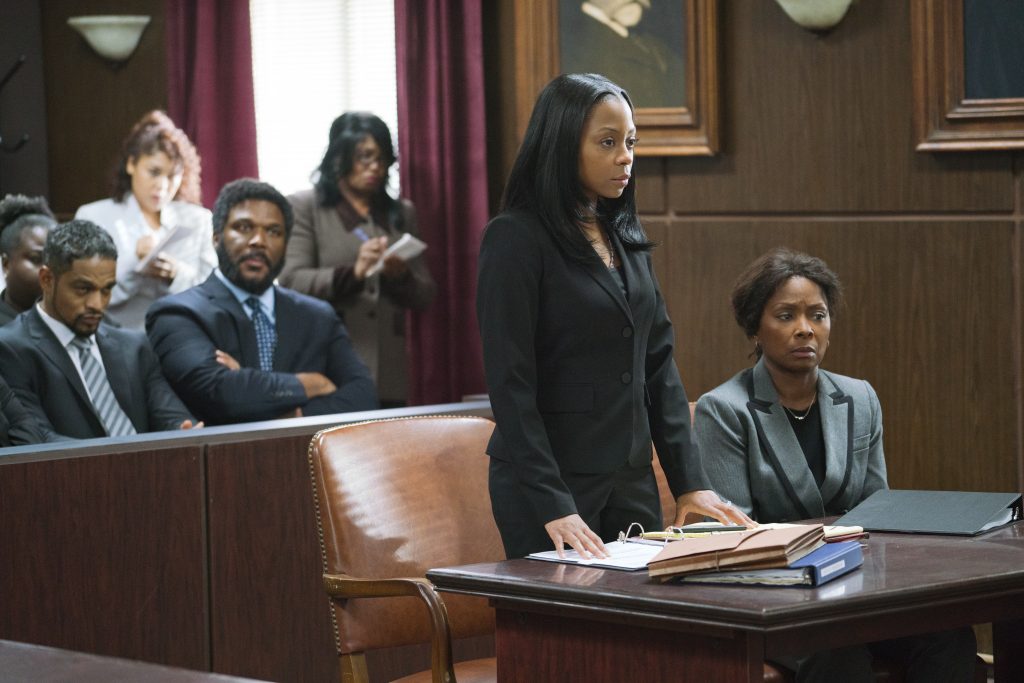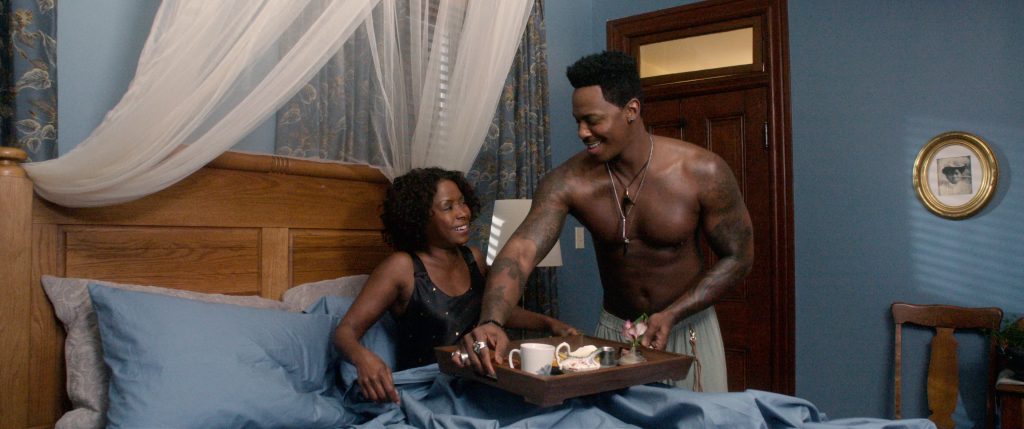February 26, 2020
by Carla Hay

Directed by Andrew Heckler
Culture Representation: Taking place primarily in the small town of Laurens, South Carolina, this dramatic film has a racially diverse cast of African American and white characters portraying the poor and working-class.
Culture Clash: The movie tells the story about racial tensions and hate crimes that get worse when local Ku Klux Klansmen open a KKK shop/museum in the town, and one of the KKK members becomes a former racist.
Culture Audience: “Burden” will appeal primarily to people who like to see dramatic retellings of stories about people involved with civil rights and fighting racism.

There’s been a mini-trend of “based on a true story” feature films about white racists who change their bigoted ways of thinking, by having unlikely friendships with black people. In the movie, one black person in particular makes the difference in reforming the white racist. We saw this same premise in 2018’s Oscar-winning “Green Book,” 2019’s “The Best of Enemies” and now in 2020’s “Burden.”
Written and directed by Andrew Heckler (his first feature-length film), “Burden” won’t be nominated for any Oscars, but it’s a solid film that has a top-notch cast, even though the movie can veer into well-worn clichés. The movie’s timeless message is more important than the recycled way that much of the movie was filmed.
Taking place in the small town of Laurens, South Carolina, in the mid-to-late 1990s, the story is told mainly from the perspective of the title character, Mike Burden (played by Garrett Hedlund), a self-described “redneck” troublemaker who was orphaned at an early age. The movie begins in the spring of 1996, when Mike (who’s in his 20s) is making his living at a repo company, which is not-so-subtly called Plantation Repossession. He also has a long history of being a criminal. Most of his antisocial behavior consists of violent hate crimes, because he’s a longtime member of the Ku Klux Klan and has risen to the title of Grand Dragon.
Mike has a mentor/father figure in local Klan leader Tom Griffin (played by Tom Wilkinson), who is grooming Mike to be his successor. Mike is such a part of Tom’s family that he’s become like a brother to Tom’s son Clint (played by Austin Hébert), who works with Mike at Plantation Repossession. Tom’s wife Hazel (played by Tess Harper) is also a white supremacist who’s proud to have her family in the KKK.
Tom, Mike and other local Klansman have opened up a storefront in town called the Redneck Shop and KKK Museum, despite objections from many of the citizens in Laurens and beyond. One of the most vocal protestors is Rev. David Kennedy (played by Forest Whitaker), the leader of the New Beginnings Missionary Baptist Church. Rev. Kennedy is a devoted family man to his wife Janice (played by Crystal Fox) and teenage son Kelvin (played by Dexter Darden).
Meanwhile, the movie shows two other people who eventually play a role in Mike Burden’s transformation. One is a single mother named Judy (played by Andrea Riseborough), who first meets Mike when he and Clint come over to her house to repossess items from her live-in boyfriend, who’s an unemployed former NASCAR driver and a heavy drinker. The other person is Mike’s former schoolmate Clarence Brooks (played by Usher Raymond, also known as Grammy-winning singer Usher), who encounters Mike and Clint when they go over to Clarence’s house to repossess his television.
Even though Clarence tells them his sob story about being laid off due to company cutbacks and asks the repo men to give him a break, Mike and Clint are unmoved. Clarence tries to appeal to Mike’s memories of when they were friends as young kids, but Mike somewhat smugly tells Clarence that he can’t make an exception for him or else he and Clint will lose their jobs. While they’re far enough away so Clarence can’t hear them, Clint and Mike make a racist comment about Clarence being on welfare.
The next time Mike and Judy see each other, she’s at the racetrack with her elementary-school-aged son Franklin (played by Taylor Gregory). Mike and Judy lock eyes in the way that people do in movies when you know that they’re going to fall in love. Even though Judy has broken up with her deadbeat boyfriend, she’s somewhat reluctant to date Mike because she knows about his bad reputation. But Mike is very charming and polite to her and Franklin, so eventually she gives in, and they start dating and fall in love.
Before Mike goes though his transformation, much of the story shows the dichotomy of his personality. One the one hand, he’s a hard-working employee and a romantic boyfriend to Judy. On the other hand, he participates in vicious crimes against people who aren’t white or Christian. He and his KKK cronies regularly beat up black people. And they’re the kind of racists who, when they’re driving in a truck and see a black girl walking down a deserted road by herself, they urinate on her and laugh as they pass by.
Mike’s mentor Tom thinks so highly of him that he tells everyone at a local KKK chapter meeting that he’s signing over the store/museum deed to Mike. What Mike does with that real-estate deed after he leaves the Klan becomes the center of a lawsuit that’s depicted in the last third of the film.
But before that happens, Judy makes it clear that she despises that Mike is in the KKK, and she starts spending more time working with Rev. Kennedy and the other people in his congregation who want to shut down the Redneck Shop and KKK Museum. She eventually helps Mike see the error of his ways, and he leaves the Klan.
But there are consequences, as Mike becomes the target of his former KKK comrades’ hatred. He loses his job and eventually his home. He gets beaten up by his former Klan buddies. Mike eventually turns to Rev. Kennedy for help.
Rev. Kennedy offers Mike, Judy and Franklin a place to stay at his home, which is an offer that his wife Janice objects to at first because she doesn’t want her family to be put in danger. The reverend’s son Kelvin is also upset by letting Mike and his new family into the Kennedy home and what it could mean for the Kennedy family. The danger is very real, since Clarence gets beaten up by KKK members because of Clarence’s association with Mike.
As the story unfolds, there are scenes that predictably happen. Judy’s son Franklin and Clarence’s son Duane (played by Devin Bright) become friends in a déjà vu of Mike and Clarence’s childhood friendship. The controversy over the KKK museum gets national attention, bringing Jesse Jackson (played by an actor) to town for one of the protests. Mike’s baptism (by Rev. Kennedy, of course), which takes place at a lake, shows a reformed Mike emerging from the water in slow-motion. It’s filmed with the kind of adoration that’s usually reserved for “miracle” scenes.
“Burden” sometimes gets hokey, but the good intentions outweigh the sometimes overly sentimental direction. The movie doesn’t sugarcoat that turning around a violent bigot’s life can be complicated, messy and dangerous. But the movie shows that things can improve for people who used to be enemies of each other if they have enough compassion, knowledge and resources to help people change for the better.
The former location of the Redneck Shop and KKK Museum has now been renamed the Echo Theater. According to a press release from 101 Studios (the U.S. distributor for “Burden”), 101 Studios and the New Baptist Missionary Church “are partnering to rebuild the space so that it becomes a center of positivity for the first time in its history. National and local partners, such as Lowe’s, are working with 101 Studios and the New Baptist Missionary Church to contribute supplies and materials to the renovation efforts.”
101 Studios will release “Burden” in select U.S. cinemas on February 28, 2020.


